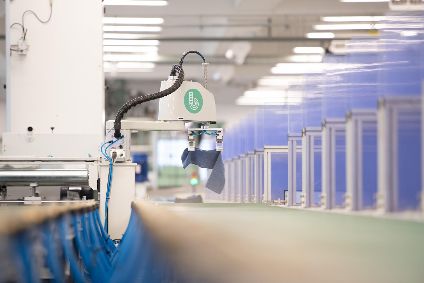
An innovative new mill in Hong Kong that upcycles textile waste into yarns that can be reused to make garments has now been scaled up and is being trialled by a number of leading brands.
When the facility in Tai Po, Hong Kong’s New Territories manufacturing hub, was soft-launched last September – and unveiled exclusively by just-style a month earlier – it was billed as the first textile mill to open in Hong Kong in almost half a century.
Now, after an initial investment of HK$15m (US$1.9m) by Hong Kong-based yarn spinner Novetex Textiles Limited, and following two years of development, it has been expanded to three production lines, each able to process up to one tonne of wool and cotton fabric per day.
The so-called Billie System – named in honour of Novetex founder Mr Kuang Piu Chao – is being described as a game-changer for brands and companies looking to revive excess inventory, unused raw materials, or textile waste.
While most recycling processes require high volumes of water and chemicals to sanitise and decolourise fabrics being upcycled into yarns or fibres, The Billie System does not consume water, emit wastewater, or produce chemical waste.
Instead, the only chemical used by the mechanical recycling system is ozone, produced on-site by pressurising oxygen in a compressor tank. Once the ozone has sanitised incoming textile waste, it is decomposed and released back into the atmosphere as oxygen.

US Tariffs are shifting - will you react or anticipate?
Don’t let policy changes catch you off guard. Stay proactive with real-time data and expert analysis.
By GlobalDataDeveloped in collaboration with the Hong Kong Research Institute of Textiles and Apparel (HKRITA) as its R&D partner, the patented system is almost entirely automated, apart from the manual removal of rigid parts such as zippers and buttons. This reduces the level of manual labour required, and the high labour costs usually associated with textile recycling. It also helps increase productivity, the company says.
Once the rigid parts are removed, the textiles are automatically sorted into different colours. From here onwards, the fabrics pass through the mechanical recycling process and are broken down into fibres, passing through two stages of UV light sanitisation before being formed into slivers.
Because the recycled fibres are ready in the form of slivers, they can then be sent to Novetex’s Zhuhai facilities to be spun into yarn.
“The close proximity of Zhuhai from Hong Kong allows us to reduce the carbon footprint of having to transport recycled fibres to faraway locations to be respun,” explains Ronna Chao, chairman of Novetex Textiles Limited.
One of the downsides of mechanical recycling is that fibres are shortened and damaged during the shredding process. So to guarantee the best quality yarn for garment production, Novetex also blends virgin fibres with the recycled fibres in its Zhuhai facilities.
Many of Novetex’s global brand clients are already trialling the system.
“The launch of The Billie System is just the next step in a series of innovations that have come before,” Ronna Chao adds. “Sustainability is not a trend but a necessity, and by providing an efficient practice for companies and brands, we are tackling not just a local problem but a global one.”
According to the Hong Kong Environmental Protection Department, 343 tonnes of textile waste are disposed in Hong Kong landfills on a daily basis – equivalent to around 700,000 sweaters. The problem of textile waste has exacerbated after Mainland China imposed a ban on waste imports from January 2018.
“We want the mill to demonstrate industrial scale in action – and if we can create a factory in a crowded city like Hong Kong to locally solve our recycling problem then no municipality in the world will have an excuse not to do it,” HKRITA CEO Edwin Keh told just-style last year.
Next steps, according to Chao, are “improving our efficiency and technology, as well as striving to make a more meaningful impact on creating a circular economy in the textile industry.
“The Billie System provides a solution to only one part of the much larger textile waste problem. We see this as the beginning of many initiatives and innovative concepts that are set to change industry standards for the better.”
Novetex Textiles, which has operations across Hong Kong, China and Asia, has already implemented sustainable practices across its vertically integrated operations, while upholding international standards including the Global Recycled Standard, the Global Organic Textile Standard (GOTS), and the Responsible Wool Standard.
The Billie System has been recognised in innovation awards globally, winning a gold medal in the International Exhibition of Inventions of Geneva, and a bronze prize in the 2019 Hong Kong Green Innovation Awards (HKGIA).



